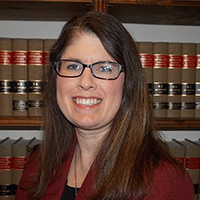Albers Divorce & Family Law Lawyer, Illinois
Cheryl Z. Fisher
✓ VERIFIEDDivorce & Family Law
Licensed in both Illinois and Missouri
Cheryl Fisher graduated summa cum laude from Saint Mary's College in 1993 with a Bachelor of Arts in Psychology. In 1997, she graduated in the top thi... (more)
Stanley Brandmeyer
Divorce & Family Law, Criminal, Business & Trade, Civil Rights
Status: In Good Standing Licensed: 37 Years
Angie Zinzilieta
Workers' Compensation, Family Law, Insurance, Personal Injury
Status: In Good Standing Licensed: 8 Years
Marsha Diane Holzhauer
Juvenile Law, Family Law, Divorce & Family Law
Status: In Good Standing Licensed: 33 Years
Misty Wuebbels
Real Estate, Estate, Divorce & Family Law, Bankruptcy, Medical Malpractice
Status: In Good Standing Licensed: 19 Years
Misty L. Wuebbels
Landlord-Tenant, Estate Planning, Adoption, Administrative Law
Status: In Good Standing Licensed: 19 Years
Kelley Zuber
Adoption, Property & Casualty, Child Support, Divorce, Child Custody
Status: In Good Standing
Kelley Vincent Zuber
Adoption, Property & Casualty, Child Support, Divorce, Child Custody
Status: In Good Standing


